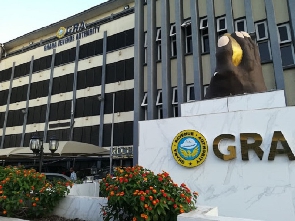The German Development Corporation’s (GIZ’s) Governance for Inclusive Development (GovID) Programme has contributed to increasing the number of registered taxpayers with the Ghana Revenue Authority (GRA) from one million in 2016 to three million in 2020.
Mr. Raphael Frerking, the Programmes Manager of GovID – GIZ, who made the disclosure, said the significant growth in registered taxpayers had contributed to a boost in national tax revenue, which rose from GhC38 billion in 2018 to GhC44 billion in 2020.
He explained the programme had supported national revenue mobilization and facilitated closer collaboration with the Ministry of Finance and the GRA, saying policies such as the Excise Tax Stamp Policy and the Transfer Pricing Policy had been developed, effectively curbing tax evasion within the private sector.
Mr. Frerking was speaking during the GovID Programme Zonal Close-out event held on Tuesday at Abesim, near Sunyani, saying that substantial progress had been made in drafting key policies, including the Environmental Fiscal Reform Policy, the updated Double Taxation Agreement Policy, and the Policy for taxation of High-Net-Worth Individuals.
The GovID programme was inaugurated in October 2019 by the German Federal Ministry of Economic Cooperation and Development, co-financed by the Swiss and British governments, and had been working closely with the Ministry of Finance and Economic Planning and the Ministry of Local Government, Decentralization and Rural Development in Ghana.
Designed to end in September 2023, and being implemented in the Middle Zone – Ashanti, Western North, Ahafo, Bono and Bono East Regions, the programme aimed at enhancing the capabilities of national and sub-national institutions to finance inclusive development in Ghana.
The participants consisted of Municipal Chief Executives, Coordinating Directors, Planning Officers, Internal Auditors, Directors of Agriculture, and other stakeholders from the five beneficiary regions.
Mr. Frerking said working with the Economic and Organised Crime Office, the Office of the Special Prosecutor and other stakeholder institutions had resulted in an updated asset recovery policy, adding that a cryptocurrency taskforce too had been established with a close cooperation with Nigerian authorities.
“All 261 Metropolitan, Municipal and District Assemblies (MMDAs) in Ghana are benefiting from enhanced data for decision-making as District Development Data Platform (DDDP) has been rolled out in all the MMDAs nationwide and is now the standard tool for data-based monitoring of the SDGs in Ghana,” he said.
“DDDP has been further developed to be utilized for performance assessment within DPAT which will allow for a more transparent process and subsequently fair distribution of the District Assemblies Common Fund,” Mr. Frerking added.
He, however, assured the DDDP would be further supported by GIZ to be fully utilized as a tool for planning and informed decision making of the MMDAs.
Mr. Frerking emphasised accountability mechanisms had been strengthened, indicating in 2018, only 58 per cent of the audit recommendations were implemented in partnership with the MMDAs, but in 2022 the number had increased to 85 per cent, reflecting significant improvement in audit functionality.
Madam Justina Owusu-Banahene, the Bono Regional Minister, said through the GovID programme, technocrats, practitioners and political leaders within the local governance space had led to the identification of core problems in both national and sub-national institutions, such as the Regional Coordinating Councils (RCCs) and MMDAs, saying an essential issue identified was the lack of adequate resources available for financing inclusive development.
She stated the importance of capacity building for improving the technical competence of RCCs and MMDAs staff, which included enhancing skills in spatial planning, budgeting, development planning, accountability, internal controls, monitoring and evaluation and auditing processes had successfully bridged knowledge gaps and contributed to improved service delivery of staff members.
Mr. Jacob Adade Ntiamoah, the Ahafo Regional Planning Officer and a participant, said the programme had been beneficial in terms of capacity building and logistical support.
He added its impact on the people had been significant as it fostered participation, transparency and improved planning and decision-making processes.
As part of the close-out certificates, citations and plaques were given to regions, MMDAs and some individuals who contributed immensely to the success of the programme within the four- year period.
Business News of Saturday, 12 August 2023
Source: GNA













